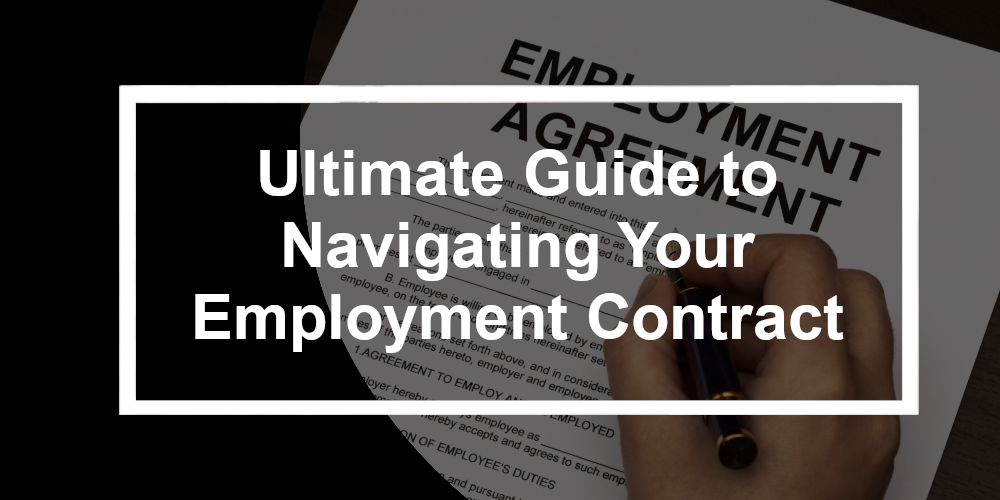
Receiving a job offer, whether it marks the end of a long journey or the exciting start of a new career chapter, is truly exhilarating. The idea of stepping into a fresh role brimming with possibilities and chances for growth can be quite energising. However, before jumping in with enthusiasm, it’s important to take a moment to pause and reflect. Even though the offer may initially seem appealing, it’s crucial to carefully examine the job contract and ensure that it aligns with your personal aspirations and values. This thoughtful assessment enables you to make well-informed choices, paving the way for a successful and rewarding career trajectory. By doing thorough research and considering the lasting effects of the offer, you can confidently set off on their professional paths, prepared to seize opportunities and make meaningful contributions in your chosen field.
1. Job Title and Responsibilities:

- Understand Your Role: Take the time to thoroughly understand the job title and responsibilities outlined in your employment contract. This section defines the scope of your role within the company and the specific tasks you’ll be expected to perform.
- Clarify Expectations: Ensure that the job description accurately reflects the position you applied for and doesn’t include additional responsibilities that you’re not comfortable with or qualified for.
- Scope for Flexibility: Consider the flexibility of the job description. A broader scope may allow your employer to assign you additional tasks or change your role over time. Make sure this aligns with your career goals and abilities.
2. Place of Work:

- Define Your Workspace: Clarify where you’ll be working, whether it’s at the company’s main office, satellite offices, or remotely.
- Remote Work Arrangements: If remote work is a possibility and has been discussed during the hiring process, ensure that the contract explicitly states this arrangement. This prevents any future disagreements regarding your work location.
- Consider Mobility: If the job requires travel or relocation to different locations, ensure that you’re comfortable with these arrangements and that they align with your lifestyle and preferences.
3. Salary, Benefits, and Bonuses:

- Verify Compensation: Confirm that the salary, benefits, and bonuses outlined in the contract match what was offered to you during the negotiation process.
- Additional Benefits: Check for provisions regarding other benefits, such as healthcare coverage, retirement plans, company vehicles, stock options, and bonuses. Ensure that these benefits are clearly defined and provided as promised.
- Understanding Bonus Structure: If bonuses are part of your compensation package, understand whether they are guaranteed or discretionary. Look for clear criteria and targets for performance-based bonuses to ensure transparency and accountability.
4. Hours of Work:

- Negotiate Work Hours: Discuss and negotiate your work schedule upfront to ensure that it aligns with your personal preferences and commitments.
- Consider Flexibility: If flexible working arrangements are important to you, discuss this with your employer and ensure that the contract reflects any agreed-upon arrangements.
- Overtime and Expectations: Clarify whether the job requires overtime work and whether you will be compensated for any additional hours beyond the standard workweek.
5. Holidays:

- Understanding Holiday Entitlements: Familiarise yourself with the company’s holiday policy outlined in the contract. Pay attention to details such as the holiday year, restrictions on when holidays can be taken, and the process for requesting time off.
- Rolling Over Holidays: Determine whether any unused holiday days can be carried over to the following year or if they will be forfeited at the end of the holiday year.
6. Restrictive Covenants:

- Future Considerations: Pay close attention to any restrictive covenants included in the contract, as they may impact your future career opportunities.
- Potential Limitations: Be aware of clauses that restrict your actions after leaving the company, such as non-compete agreements, non-solicitation clauses, and confidentiality agreements.
7. Notice Period:

- Consider Notice Period: Review the notice period specified in the contract. Ensure that it provides you with a reasonable amount of time to transition out of the role if needed.
- Balance Stability and Flexibility: A notice period that is too long may limit your ability to pursue new opportunities, while a notice period that is too short may not provide you with enough stability.
At Hunterskill, we value the well-being and satisfaction of our candidates above all else. Before finalising your employment contract, we encourage you to carefully review and fully understand every aspect. Your comprehension and confidence in the terms outlined in your employment agreement are crucial for starting a successful and fulfilling career with us. We believe in being transparent and accountable in all our interactions, ensuring that you have all the information needed to make decisions that align with your goals and aspirations. Furthermore, as you go through the registration process with Hunterskill, we stress the importance of going through the candidate terms of engagement as well as the key information document. These documents offer vital details about your rights, duties and our services, empowering you to make informed decisions about your career path.
Whether you’re considering a new opportunity or contemplating a career transition, we encourage you to upload your CV and complete our online registration form to join our talent pool. By partnering with us, you gain access to a diverse range of job opportunities tailored to your skills and preferences. Additionally, employers seeking exceptional talent can post job vacancies, providing you with even more avenues to explore. At Hunterskill, we’re committed to facilitating meaningful connections between candidates and employers, empowering individuals to thrive in their professional endeavours. Browse our extensive list of jobs today and discover the next exciting chapter in your career journey.